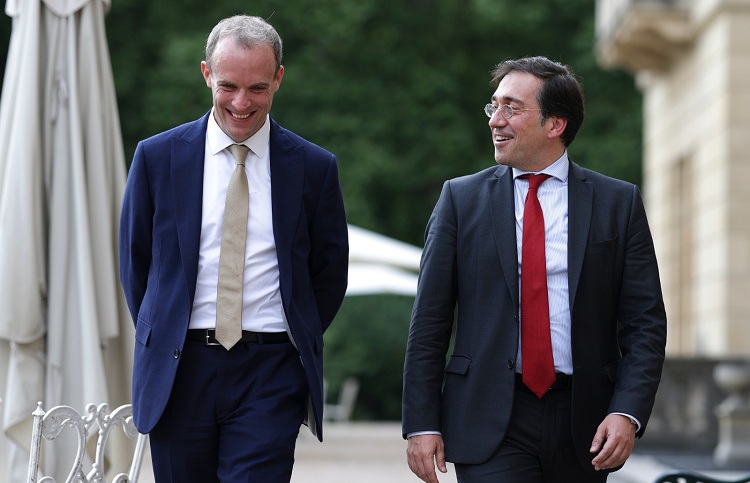Eduardo González
The Minister of Foreign Affairs, José Manuel Albares, announced yesterday in London to his British counterpart, Dominic Raab, the name of the future Spanish ambassador to the United Kingdom, a post that has been vacant since last February after the resignation of Carlos Bastarreche due to retirement.
According to Ministry sources informed to The Diplomat, the minister informed Raab that the Spanish authorities have already requested the approval for the new ambassador. The same sources did not specify the name of the future representative of Spain, although they did indicate that it is a diplomat with long experience in Brexit issues and that his appointment had been discussed this past Tuesday during the meeting of the Council of Ministers.
The visit to London was on the agenda of the previous minister, Arancha González Laya, but Albares decided to keep it because he considers that it will contribute to “generate confidence” with the Government of the United Kingdom, a country with which Spain maintains “dense” relations in numerous matters, such as trade, tourism, investments or the “hundreds of thousands” of citizens of both countries who reside in the other country, as the minister himself told the Spanish press after his interview with Raab. “Many thanks (to Albares) for granting the UK the honor of his first foreign visit as foreign minister”, Raab wrote on his Twitter account.
José Manuel Albares has thus become the second foreign minister not to start his international agenda in Morocco, a tradition that had been broken, precisely, by González Laya. “Seeing a foreign minister this Wednesday or in a month’s time does not affect Spain’s interests”, he assured yesterday morning in response to a question from the press about this postponement of the trip to Morocco, a country with which Spain is currently going through a serious diplomatic crisis.
The mandate of Brussels on Gibraltar
On the other hand, according to Albares, the main reason for his trip to London was not the recent approval by the European Commission of the mandate for negotiations with the United Kingdom on the future status of Gibraltar, whose basis is the pre-agreement signed by Spain and the United Kingdom last December 31 and which has been rejected by the British and Gibraltarian governments.
However, he said, the meeting with Raab – which was “frankly” good – has helped to “generate a climate of confidence” regarding Gibraltar. “We are going to comply with everything agreed on December 31 and we are going to request the assistance of Frontex, and I have conveyed this to him”, he assured reporters in London.
The main sticking point of the Brussels mandate is the establishment of “control and surveillance” of the external borders of the Schengen zone “in the port, airport and waters of Gibraltar” and its assignment to Spain, “in application of existing EU rules”. Therefore, “Spanish border guards will have all the necessary powers to carry out border checks and surveillance and to comply with the ensuing obligations”, the text continues. Both the United Kingdom and Gibraltar are flatly opposed to this possibility.
However, the mandate takes “note” that Spain has expressed its wish to request the collaboration of the European Border and Coastguard Agency (Frontex) to control the port and airport of the Rock, as the Spanish and British governments had agreed in the New Year’s Eve pre-agreement to avoid tensions. In this case, the work of control and surveillance would correspond to Frontex during a transitional period of four years, while the Spanish agents would be located outside Gibraltarian territory but would maintain control over the people who want to access Spain and, consequently, the Schengen area.
On the other hand, Albares and Raab took advantage of their meeting to renew three of the four bilateral Memoranda of Understanding between Spain and the United Kingdom relating to Gibraltar (Police and Customs Cooperation, Cooperation on Environmental Matters and on Tobacco and Other Products, all made in Madrid and London in November 2018). The validity of these memoranda had lapsed last December 31, 2020, following the end of the transitional period provided for in the United Kingdom’s Withdrawal Agreement from the European Union. The fourth Memorandum of Understanding on Citizens’ Rights has remained in force.






